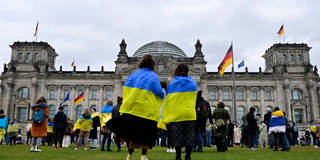“Decoloniality,” an intellectual framework for critiquing Western institutions, public discourse, and individual behavior, has been unable to confront Russia's genocidal war against Ukraine. That's because Western political and cultural institutions have long disregarded Eastern European perspectives in favor of the view from Moscow.
KYIV – After the fall of the Berlin Wall and the collapse of the USSR, it was generally believed that Eastern Europe should simply catch up with the West. Liberated from Soviet rule, these states would undergo a natural and spontaneous transformation, smoothly assimilating into the Western economic, political, and social order. But Russia’s invasion of Ukraine has revealed that it is the West that must catch up with political developments in the East.

KYIV – After the fall of the Berlin Wall and the collapse of the USSR, it was generally believed that Eastern Europe should simply catch up with the West. Liberated from Soviet rule, these states would undergo a natural and spontaneous transformation, smoothly assimilating into the Western economic, political, and social order. But Russia’s invasion of Ukraine has revealed that it is the West that must catch up with political developments in the East.